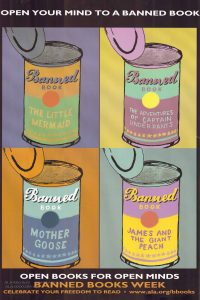
This week is the 31st annual Banned Books Week, an event when the American Library Association and numerous other sponsors encourage the reading of banned and challenged books. The week was first inspired by the success of the Banned Book Exhibit at an American Booksellers Association (ABA) convention in 1982, which featured almost 500 banned and challenged books.[1]
On July 7, 1982, Allan Marshall from the ABA reached out to Judith Krug, of the Office of Intellectual Freedom, inviting the ALA to endorse and cosponsor the event.[2] The ALA Executive Board was quick to vote on and approve of joining the event, making a decision days after Marshall wrote to Krug. While no money was allocated at the time, the Executive Board approved of the utilization of the ALA’s resources to make the event known.[3] In August, the American Library Association officially announced that it was joining the ABA and the National Association of College Stores in sponsorship of the first Banned Books Week.[4]
Since then, the ALA and the Office of Intellectual Freedom has continued putting out promotional materials, articles, meetings with authors, posters, and websites. And as technology changed, so has the efforts to reach people and to encourage them to read. Virtual read outs and Twitter parties have now become featured events. In some cases, the Office of Intellectual Freedom has had to defend itself and the event from criticism by columnists, concerned parents, and other organizations.[5]

The need to continue to bring awareness to banned and challenged books persists for the ALA. The Office of Intellectual Freedom has reported that there were 464 books challenged in 2012, and at least 300 books have been officially challenged in the United States for the past ten years. Recently, modern books such as Harry Potter, The Hunger Games, and The Kite Runner have graced the list of most frequently challenged books along side classics like To Kill a Mockingbird, Of Mice and Men, and The Adventures of Huckleberry Finn.[6] Many of these books end up on this list based on content such as offensive language, racism, violence, sexual explicitness, homosexuality, and the usage of drugs and alcohol by characters.
By putting on this event, the ALA and its fellow sponsors bring national attention to these books, along with bringing forth the issue of censorship and the importance of the freedom to read.
For more information, please visit: http://www.bannedbooksweek.org/
Sources
1. Allan Marshall to Judith Krug, July 7, 1982. Office of Intellectual Freedom Subject File, 1965-2008, Record Series 6/1/6, Box 39, Folder: Banned Books Week, 1982. American Library Association Archives at the University of Illinois.
2. Ibid.
3. Judith Krug to Allan Marshall, August 3, 1982. Office of Intellectual Freedom Subject File, 1965-2008, Record Series 6/1/6, Box 39, Folder: Banned Books Week, 1982. American Library Association Archives at the University of Illinois.
4. “ALA Cosponsors Banned Books Week, September 5-11,” August 1982. Office of Intellectual Freedom Subject File, 1965-2008, Record Series 6/1/6, Box 39, Folder: Banned Books Week, 1982. American Library Association Archives at the University of Illinois.
5. “ALA Issues Intellectual Freedom Alert.” (September 1995). Office of Intellectual Freedom Subject File, 1965-2008, Record Series 6/1/6, Box 33, Folder: 1995 Banned Books Week Attacks on OIF. American Library Association Archives at the University of Illinois.
6. American Library Association. “Frequently Challenged Books of the 21st Century.” 2013. http://www.ala.org/bbooks/frequentlychallengedbooks/top10. Accessed 9/24/2013.